Unit7 Food Festival Topic2 I'm not sure whether I can cook it well 知识点课件.(共21张PPT)
文档属性
| 名称 | Unit7 Food Festival Topic2 I'm not sure whether I can cook it well 知识点课件.(共21张PPT) |
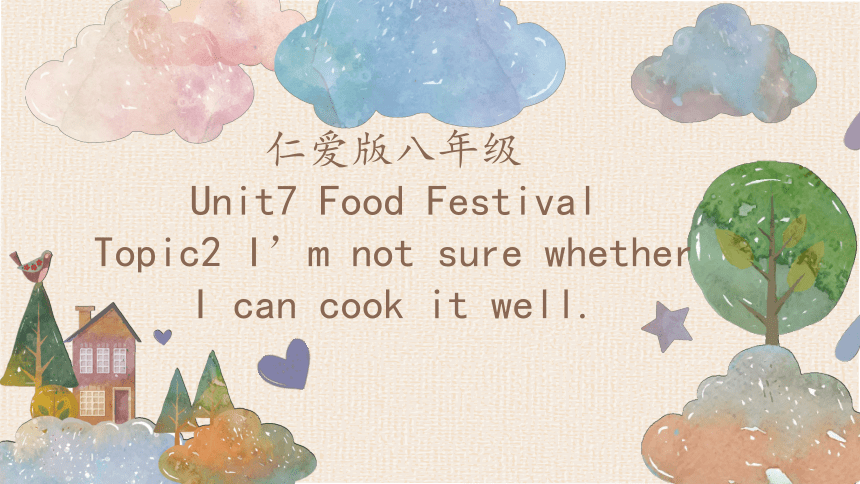
|
|
| 格式 | zip | ||
| 文件大小 | 4.2MB | ||
| 资源类型 | 教案 | ||
| 版本资源 | 仁爱科普版 | ||
| 科目 | 英语 | ||
| 更新时间 | 2020-07-03 00:00:00 | ||
图片预览

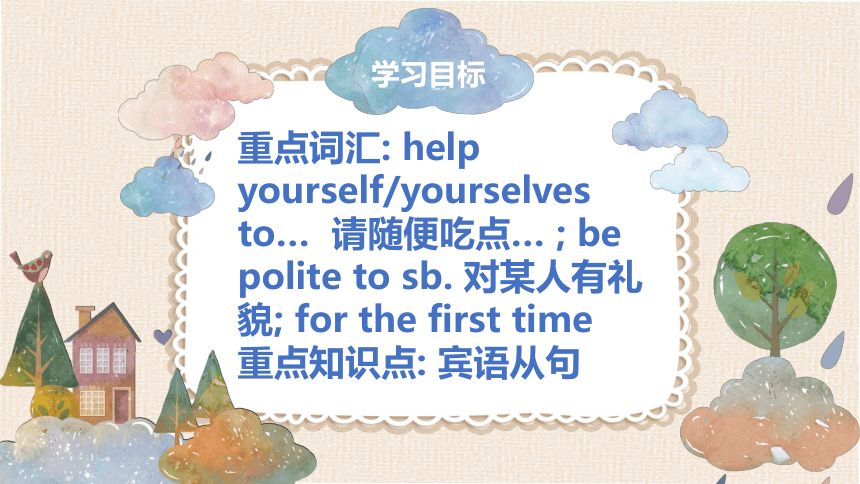



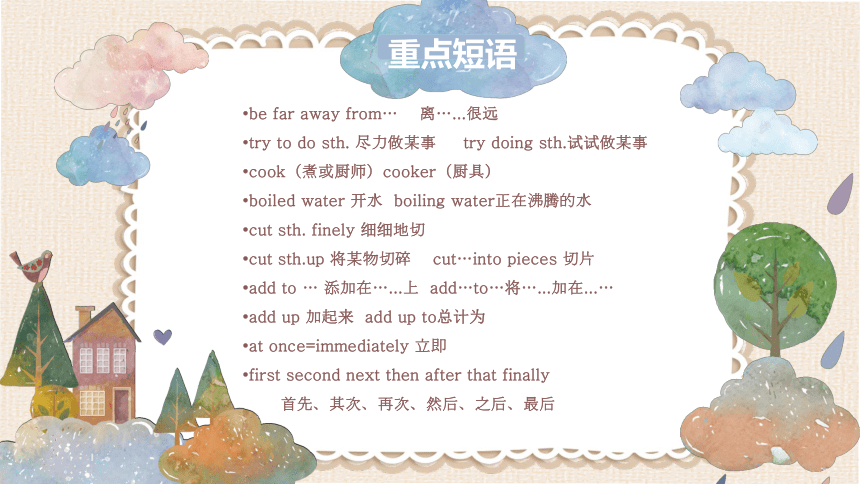

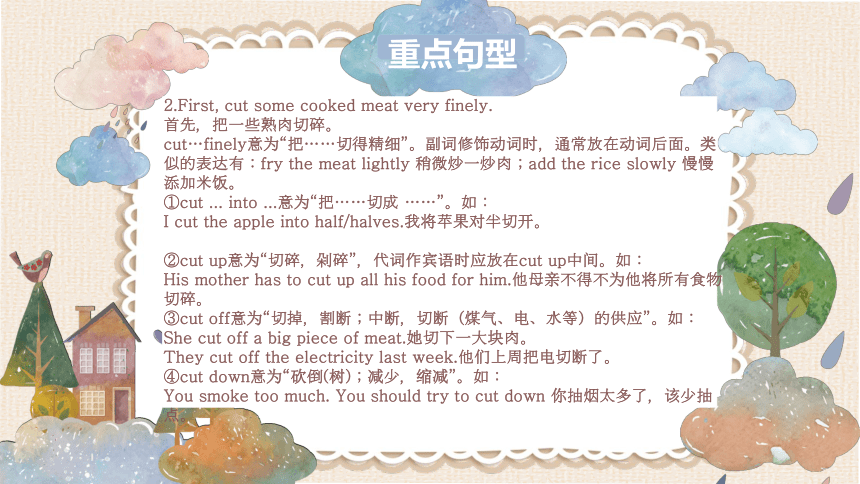
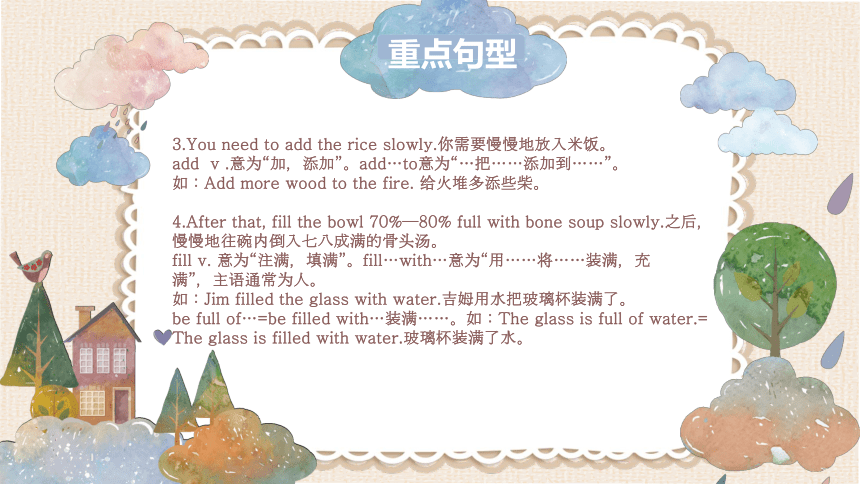
文档简介
(共21张PPT)
仁爱版八年级
Unit7
Food
Festival
Topic2
I’m
not
sure
whether
I
can
cook
it
well.
学习目标
重点词汇:
help
yourself/yourselves
to…?
请随便吃点…
;
be
polite
to
sb.
对某人有礼貌;
for
the
first
time??
重点知识点:
宾语从句
知识梳理
重点短语
重点句型
重点语法
重点短语
?make
fried
rice?????
做炒米饭
?at
the
same
time?????
同时
?cut…into…???????
把...…切成…...
?cooked
meat??????
熟肉
?fill…with…??????
用...…填满...…
?a
piece
of…???????
一张(片...…)
?help
yourself
/
yourselves
to…?
请随便吃点…
?be
polite
to
sb.????????
对某人有礼貌
?for
the
first
time???????
第一次
?western
table
manners??
西方的餐桌礼仪
?at
table??????????????
在用餐
?at
the
table???????????
在桌旁
?start
/
begin
with…????
以…开始
?eat
up???????????????
吃光
?drink
to
sb.??????????
与某人干杯
重点短语
?raise
your
glass???????
举起你的杯子
?how
to
do
it=what
to
do
?too
much
+
不可数名词????
太多…
?much
too
+
形容词
/
副词?
太…
?too
many
+
复数名词?????
太多…
?point
at…??????????
指着…...
?pick
sth.
up?????????
捡起某物
?pick
sb.
up????????
(开车)接某人
?eating
habits???????
饮食习惯
?use
sth.
for
(doing)
sth.
=
use
sth.
to
do
sth.?
?
用某物来做某事
?two
or
more
…??
两个或者更多…...
?in
the
southern
part
of
China??
在中国的南方
?in
the
central
and
western
parts?
在中部和西部
重点短语
?be
far
away
from…???
离…...很远
?try
to
do
sth.
尽力做某事????
try
doing
sth.试试做某事
?cook(煮或厨师)cooker(厨具)
?boiled
water
开水?
boiling
water正在沸腾的水
?cut
sth.
finely
细细地切
?cut
sth.up
将某物切碎???
cut…into
pieces
切片
?add
to
…
添加在…...上?
add…to…将…...加在...…??
?add
up
加起来?
add
up
to总计为???
?at
once=immediately
立即????
?first
second
next
then
after
that
finally?????
??????
首先、其次、再次、然后、之后、最后
重点句型
1.It’s
very
kind
of
you.你真是太好了(太感谢你了)。
常用于表扬、赞美对方,也可用于对对方所做的事表示感谢。如:
—Here
are
my
books.
You
can
read
them
anytime.这是我的书,你随时可以读。
—It’s
very
kind
of
you.太谢谢你了。
(1)
be
kind
to
sb.意为“对某人友好,善待某人”。如:
He
is
kind
to
the
old.他对老人很好。
?
(2)
be
+
adj.
+
of
sb.与be
+
adj.
+
for
sb.的区别:
①It’s
kind
of
you
to
do
that.你那样做真是太好了。
②It’s
important
for
us
to
work
hard.对于我们来说,努力学习很重要。
在句①中kind表示的是of后边人称的特点、特征或性格。类似的形容词还有:good,
nice,
wise,
clever,
cruel等。
在句②中important表示的是不定式to
do
sth.的情况。
kind
n.种类,a
kind
of—种;many
kinds
of
许多种;all
kinds
of各种各样的;different
kinds
of
不同各类的;a
kind
of同一种类的
重点句型
2.First,
cut
some
cooked
meat
very
finely.
首先,把一些熟肉切碎。
cut…finely意为“把……切得精细”。副词修饰动词时,通常放在动词后面。类似的表达有:fry
the
meat
lightly
稍微炒一炒肉;add
the
rice
slowly
慢慢添加米饭。
①cut
...
into
...意为“把……切成
……”。如:
I
cut
the
apple
into
half/halves.我将苹果对半切开。
?
②cut
up意为“切碎,剁碎”,代词作宾语时应放在cut
up中间。如:
His
mother
has
to
cut
up
all
his
food
for
him.他母亲不得不为他将所有食物切碎。
③cut
off意为“切掉,割断;中断,切断(煤气、电、水等)的供应”。如:
She
cut
off
a
big
piece
of
meat.她切下一大块肉。
They
cut
off
the
electricity
last
week.他们上周把电切断了。
④cut
down意为“砍倒(树);减少,缩减”。如:
You
smoke
too
much.
You
should
try
to
cut
down
你抽烟太多了,该少抽点。
重点句型
3.You
need
to
add
the
rice
slowly.你需要慢慢地放入米饭。
add?
v
.意为“加,添加”。add…to意为“…把……添加到……”。
如:Add
more
wood
to
the
fire.
给火堆多添些柴。
4.After
that,
fill
the
bowl
70%—80%
full
with
bone
soup
slowly.之后,
慢慢地往碗内倒入七八成满的骨头汤。
fill
v.
意为“注满,填满”。fill…with…意为“用……将……装满,充
满”,主语通常为人。
如:Jim
filled
the
glass
with
water.吉姆用水把玻璃杯装满了。
be
full
of…=be
filled
with…装满……。如:The
glass
is
full
of
water.=
The
glass
is
filled
with
water.玻璃杯装满了水。
重点语法
1.
宾语从句:?主语+连词+宾语从句?
Eg.
I
think
(that)
we
can
have
it
on
our
school
playground
on
Sunday.
??
I’m
sure(that)
fried
rice
and
dumplings
will
be
popular.
?
【速记口诀】
宾语从句须注意,几点事项应牢记。
一是关键引导词,不同句子词相异。陈述句子用that;一般疑问是否(if,
whether)替;特殊问句更好办,引导还用疑问词。二是时态常变化,主句不同从句异。主句若为现在时,从句时态应看意;主句若为过去时,从句时态向前移。三是语序要记清,从句永保陈述语序。
重点语法
【妙语诠释】
宾语从句应注意三点:
①引导词,陈述句一般由that引导,这时的that可以省略;一般疑问句则由if或whether引导;而特殊疑问句则由特殊疑问词引导。
②时态,主句是现在时态,从句可用所需要的任何时态;但如果主句是过去时态,从句时态所表示时间一般往前移一个时间段。
③语序,宾语从句永远要用陈述句语序。
2.
副词的比较等级和最高级
单音节和少数双音节词比较级和最高级构成方法:
1)一般情况在词尾加上__er__或__est___
2)以e结尾的形容词,在词尾加上__r__或__est___
3)以辅音字母加结尾的y形容词,先变__y___为__i__
再加_er_或_est_
4)以1个辅音字母结尾的重读闭音节,先_双写__末尾的
这个辅音字母,再加上再加__er__或___est____
重点语法
随堂练习
一、根据句意及汉语提示补全单词。
1.
Don’t
cook
your
vegetables
with
too
much
______(油).
It’s
not
good
for
your
health.
2.?—The
coffee
tastes
too
bitter(苦的)
.
I
don’t
like
it.
—You
may
______(添加)
some
sugar
into
it.
3.
—Kangkang,
you
have
only
one
______(碗)
of
rice.
You
should
have
some
more.
—Mom,
I’m
full.
4.
—You
always
have
______(面条)
on
your
birthday.
—It
means
we
will
have
a
long
life.
5.?—You’ll
have
to
be
______(迅速的),
we
may
be
late
for
the
bus.
—OK.
Let’s
leave
for
the
station
at
once.
随堂练习
一、根据句意及汉语提示补全单词。
1.
Don’t
cook
your
vegetables
with
too
much
______(油).
It’s
not
good
for
your
health.
2.?—The
coffee
tastes
too
bitter(苦的)
.
I
don’t
like
it.
—You
may
______(添加)
some
sugar
into
it.
3.
—Kangkang,
you
have
only
one
______(碗)
of
rice.
You
should
have
some
more.
—Mom,
I’m
full.
4.
—You
always
have
______(面条)
on
your
birthday.
—It
means
we
will
have
a
long
life.
5.?—You’ll
have
to
be
______(迅速的),
we
may
be
late
for
the
bus.
—OK.
Let’s
leave
for
the
station
at
once.
答案:1.
oil
?????2.
add
?????3.
bowl
????4.
noodles
???5.
quick
随堂练习
二、单项选择。
1.?—Would
you
like
a
cheese
pie?
—No,
thanks.
A
sandwich
____
honey.
A.
on
????????????????
B.
with
????????????????????
C.
in
?????????????????
D.
for
2.?—I’m
not
sure
____
or
not
he
sent
me
an
e-mail
yesterday.
—Maybe
he’ll
call
you
later.
A.
if
??????????????????
B.
why
?????????????
C.
whether
???????
D.
when
3.?—Can
you
tell
me
____
it’s
polite
to
eat
noisily
in
Japan?
—It’s
polite.
A.
if?
????????????????
B.
whether?
?????
C.
when??????????????
D.
both
A
and
B
4.?—We
don’t
know
____
to
smoke
during
a
meal
in
China.
—I
think
it’s
not
polite.
A.
that
it
is
polite??????????????????????????????????
B.
if
is
it
polite
C.
how
it
is
polite???????????????????????????
D.
if
it
is
polite
5.?—Could
you
show
me
how
to
make
tea?
—Sure.
____
A.
Let’s
do
it
together.???????????????????
B.
Let
me
try.
C.
You
can
do
it.????????????????????????????
D.
You’re
not
bad.
随堂练习
二、单项选择。
1.?—Would
you
like
a
cheese
pie?
—No,
thanks.
A
sandwich
____
honey.
A.
on
????????????????
B.
with
????????????????????
C.
in
?????????????????
D.
for
2.?—I’m
not
sure
____
or
not
he
sent
me
an
e-mail
yesterday.
—Maybe
he’ll
call
you
later.
A.
if
??????????????????
B.
why
?????????????
C.
whether
???????
D.
when
3.?—Can
you
tell
me
____
it’s
polite
to
eat
noisily
in
Japan?
—It’s
polite.
A.
if?
????????????????
B.
whether?
?????
C.
when??????????????
D.
both
A
and
B
4.?—We
don’t
know
____
to
smoke
during
a
meal
in
China.
—I
think
it’s
not
polite.
A.
that
it
is
polite??????????????????????????????????
B.
if
is
it
polite
C.
how
it
is
polite???????????????????????????
D.
if
it
is
polite
5.?—Could
you
show
me
how
to
make
tea?
—Sure.
____
A.
Let’s
do
it
together.???????????????????
B.
Let
me
try.
C.
You
can
do
it.????????????????????????????
D.
You’re
not
bad.
答案:1.
B
2.
C
3.
D
4.
D
5.
A
随堂练习
三、根据句意及汉语提示拼写单词。
1.
Good
__________
(饮食习惯)
are
good
for
our
health.
2.
In
the
__________
(南部)
part
of
China,
it
often
rains
in
summer.
3.
I
helped
him
________
(捡起)
his
books,
and
asked
him
where
he
lived.
4.
Is
the
picture
________
(与……不同)
that
one?
5.
There
are
two
or
more
________
(菜肴)
for
every
meal
in
Europe.
随堂练习
三、根据句意及汉语提示拼写单词。
1.
Good
__________
(饮食习惯)
are
good
for
our
health.
2.
In
the
__________
(南部)
part
of
China,
it
often
rains
in
summer.
3.
I
helped
him
________
(捡起)
his
books,
and
asked
him
where
he
lived.
4.
Is
the
picture
________
(与……不同)
that
one?
5.
There
are
two
or
more
________
(菜肴)
for
every
meal
in
Europe.
答案:1.
eating
habits???
2.
southern
3.
pick
up?
4.
different
from
5.
courses
随堂练习
四、根据汉语意思及括号中的英语提示词翻译句子。
1.?玛丽学习比以前努力。(hard,than)
_______________________________________________________
2.?他是所有人之中跑得最快的。(fast,of)
_______________________________________________________
3.?她唱得比凯特好。(well)
_______________________________________________________
4.?你介意我把车停在这儿吗?(mind,if)
_______________________________________________________
5.?你知道她是否会说英语吗?(if)
_______________________________________________________
随堂练习
四、根据汉语意思及括号中的英语提示词翻译句子。
1.?玛丽学习比以前努力。(hard,than)
_______________________________________________________
2.?他是所有人之中跑得最快的。(fast,of)
_______________________________________________________
3.?她唱得比凯特好。(well)
_______________________________________________________
4.?你介意我把车停在这儿吗?(mind,if)
_______________________________________________________
5.?你知道她是否会说英语吗?(if)
_______________________________________________________
答案:1.
Mary
studies
harder
than
before.
2.
Of
all,
he
runs
fastest.
/
He
runs
fastest
of
all.
3.
She
sings
better
than
Kate.
4.
Do
you
mind
if
I
park
my
car
here?
/
Do
you
mind
my
parking
my
car
here?
5.
Do
you
know
if
/
whether
she
can
speak
English?
谢谢观看!
仁爱版八年级
Unit7
Food
Festival
Topic2
I’m
not
sure
whether
I
can
cook
it
well.
学习目标
重点词汇:
help
yourself/yourselves
to…?
请随便吃点…
;
be
polite
to
sb.
对某人有礼貌;
for
the
first
time??
重点知识点:
宾语从句
知识梳理
重点短语
重点句型
重点语法
重点短语
?make
fried
rice?????
做炒米饭
?at
the
same
time?????
同时
?cut…into…???????
把...…切成…...
?cooked
meat??????
熟肉
?fill…with…??????
用...…填满...…
?a
piece
of…???????
一张(片...…)
?help
yourself
/
yourselves
to…?
请随便吃点…
?be
polite
to
sb.????????
对某人有礼貌
?for
the
first
time???????
第一次
?western
table
manners??
西方的餐桌礼仪
?at
table??????????????
在用餐
?at
the
table???????????
在桌旁
?start
/
begin
with…????
以…开始
?eat
up???????????????
吃光
?drink
to
sb.??????????
与某人干杯
重点短语
?raise
your
glass???????
举起你的杯子
?how
to
do
it=what
to
do
?too
much
+
不可数名词????
太多…
?much
too
+
形容词
/
副词?
太…
?too
many
+
复数名词?????
太多…
?point
at…??????????
指着…...
?pick
sth.
up?????????
捡起某物
?pick
sb.
up????????
(开车)接某人
?eating
habits???????
饮食习惯
?use
sth.
for
(doing)
sth.
=
use
sth.
to
do
sth.?
?
用某物来做某事
?two
or
more
…??
两个或者更多…...
?in
the
southern
part
of
China??
在中国的南方
?in
the
central
and
western
parts?
在中部和西部
重点短语
?be
far
away
from…???
离…...很远
?try
to
do
sth.
尽力做某事????
try
doing
sth.试试做某事
?cook(煮或厨师)cooker(厨具)
?boiled
water
开水?
boiling
water正在沸腾的水
?cut
sth.
finely
细细地切
?cut
sth.up
将某物切碎???
cut…into
pieces
切片
?add
to
…
添加在…...上?
add…to…将…...加在...…??
?add
up
加起来?
add
up
to总计为???
?at
once=immediately
立即????
?first
second
next
then
after
that
finally?????
??????
首先、其次、再次、然后、之后、最后
重点句型
1.It’s
very
kind
of
you.你真是太好了(太感谢你了)。
常用于表扬、赞美对方,也可用于对对方所做的事表示感谢。如:
—Here
are
my
books.
You
can
read
them
anytime.这是我的书,你随时可以读。
—It’s
very
kind
of
you.太谢谢你了。
(1)
be
kind
to
sb.意为“对某人友好,善待某人”。如:
He
is
kind
to
the
old.他对老人很好。
?
(2)
be
+
adj.
+
of
sb.与be
+
adj.
+
for
sb.的区别:
①It’s
kind
of
you
to
do
that.你那样做真是太好了。
②It’s
important
for
us
to
work
hard.对于我们来说,努力学习很重要。
在句①中kind表示的是of后边人称的特点、特征或性格。类似的形容词还有:good,
nice,
wise,
clever,
cruel等。
在句②中important表示的是不定式to
do
sth.的情况。
kind
n.种类,a
kind
of—种;many
kinds
of
许多种;all
kinds
of各种各样的;different
kinds
of
不同各类的;a
kind
of同一种类的
重点句型
2.First,
cut
some
cooked
meat
very
finely.
首先,把一些熟肉切碎。
cut…finely意为“把……切得精细”。副词修饰动词时,通常放在动词后面。类似的表达有:fry
the
meat
lightly
稍微炒一炒肉;add
the
rice
slowly
慢慢添加米饭。
①cut
...
into
...意为“把……切成
……”。如:
I
cut
the
apple
into
half/halves.我将苹果对半切开。
?
②cut
up意为“切碎,剁碎”,代词作宾语时应放在cut
up中间。如:
His
mother
has
to
cut
up
all
his
food
for
him.他母亲不得不为他将所有食物切碎。
③cut
off意为“切掉,割断;中断,切断(煤气、电、水等)的供应”。如:
She
cut
off
a
big
piece
of
meat.她切下一大块肉。
They
cut
off
the
electricity
last
week.他们上周把电切断了。
④cut
down意为“砍倒(树);减少,缩减”。如:
You
smoke
too
much.
You
should
try
to
cut
down
你抽烟太多了,该少抽点。
重点句型
3.You
need
to
add
the
rice
slowly.你需要慢慢地放入米饭。
add?
v
.意为“加,添加”。add…to意为“…把……添加到……”。
如:Add
more
wood
to
the
fire.
给火堆多添些柴。
4.After
that,
fill
the
bowl
70%—80%
full
with
bone
soup
slowly.之后,
慢慢地往碗内倒入七八成满的骨头汤。
fill
v.
意为“注满,填满”。fill…with…意为“用……将……装满,充
满”,主语通常为人。
如:Jim
filled
the
glass
with
water.吉姆用水把玻璃杯装满了。
be
full
of…=be
filled
with…装满……。如:The
glass
is
full
of
water.=
The
glass
is
filled
with
water.玻璃杯装满了水。
重点语法
1.
宾语从句:?主语+连词+宾语从句?
Eg.
I
think
(that)
we
can
have
it
on
our
school
playground
on
Sunday.
??
I’m
sure(that)
fried
rice
and
dumplings
will
be
popular.
?
【速记口诀】
宾语从句须注意,几点事项应牢记。
一是关键引导词,不同句子词相异。陈述句子用that;一般疑问是否(if,
whether)替;特殊问句更好办,引导还用疑问词。二是时态常变化,主句不同从句异。主句若为现在时,从句时态应看意;主句若为过去时,从句时态向前移。三是语序要记清,从句永保陈述语序。
重点语法
【妙语诠释】
宾语从句应注意三点:
①引导词,陈述句一般由that引导,这时的that可以省略;一般疑问句则由if或whether引导;而特殊疑问句则由特殊疑问词引导。
②时态,主句是现在时态,从句可用所需要的任何时态;但如果主句是过去时态,从句时态所表示时间一般往前移一个时间段。
③语序,宾语从句永远要用陈述句语序。
2.
副词的比较等级和最高级
单音节和少数双音节词比较级和最高级构成方法:
1)一般情况在词尾加上__er__或__est___
2)以e结尾的形容词,在词尾加上__r__或__est___
3)以辅音字母加结尾的y形容词,先变__y___为__i__
再加_er_或_est_
4)以1个辅音字母结尾的重读闭音节,先_双写__末尾的
这个辅音字母,再加上再加__er__或___est____
重点语法
随堂练习
一、根据句意及汉语提示补全单词。
1.
Don’t
cook
your
vegetables
with
too
much
______(油).
It’s
not
good
for
your
health.
2.?—The
coffee
tastes
too
bitter(苦的)
.
I
don’t
like
it.
—You
may
______(添加)
some
sugar
into
it.
3.
—Kangkang,
you
have
only
one
______(碗)
of
rice.
You
should
have
some
more.
—Mom,
I’m
full.
4.
—You
always
have
______(面条)
on
your
birthday.
—It
means
we
will
have
a
long
life.
5.?—You’ll
have
to
be
______(迅速的),
we
may
be
late
for
the
bus.
—OK.
Let’s
leave
for
the
station
at
once.
随堂练习
一、根据句意及汉语提示补全单词。
1.
Don’t
cook
your
vegetables
with
too
much
______(油).
It’s
not
good
for
your
health.
2.?—The
coffee
tastes
too
bitter(苦的)
.
I
don’t
like
it.
—You
may
______(添加)
some
sugar
into
it.
3.
—Kangkang,
you
have
only
one
______(碗)
of
rice.
You
should
have
some
more.
—Mom,
I’m
full.
4.
—You
always
have
______(面条)
on
your
birthday.
—It
means
we
will
have
a
long
life.
5.?—You’ll
have
to
be
______(迅速的),
we
may
be
late
for
the
bus.
—OK.
Let’s
leave
for
the
station
at
once.
答案:1.
oil
?????2.
add
?????3.
bowl
????4.
noodles
???5.
quick
随堂练习
二、单项选择。
1.?—Would
you
like
a
cheese
pie?
—No,
thanks.
A
sandwich
____
honey.
A.
on
????????????????
B.
with
????????????????????
C.
in
?????????????????
D.
for
2.?—I’m
not
sure
____
or
not
he
sent
me
an
yesterday.
—Maybe
he’ll
call
you
later.
A.
if
??????????????????
B.
why
?????????????
C.
whether
???????
D.
when
3.?—Can
you
tell
me
____
it’s
polite
to
eat
noisily
in
Japan?
—It’s
polite.
A.
if?
????????????????
B.
whether?
?????
C.
when??????????????
D.
both
A
and
B
4.?—We
don’t
know
____
to
smoke
during
a
meal
in
China.
—I
think
it’s
not
polite.
A.
that
it
is
polite??????????????????????????????????
B.
if
is
it
polite
C.
how
it
is
polite???????????????????????????
D.
if
it
is
polite
5.?—Could
you
show
me
how
to
make
tea?
—Sure.
____
A.
Let’s
do
it
together.???????????????????
B.
Let
me
try.
C.
You
can
do
it.????????????????????????????
D.
You’re
not
bad.
随堂练习
二、单项选择。
1.?—Would
you
like
a
cheese
pie?
—No,
thanks.
A
sandwich
____
honey.
A.
on
????????????????
B.
with
????????????????????
C.
in
?????????????????
D.
for
2.?—I’m
not
sure
____
or
not
he
sent
me
an
yesterday.
—Maybe
he’ll
call
you
later.
A.
if
??????????????????
B.
why
?????????????
C.
whether
???????
D.
when
3.?—Can
you
tell
me
____
it’s
polite
to
eat
noisily
in
Japan?
—It’s
polite.
A.
if?
????????????????
B.
whether?
?????
C.
when??????????????
D.
both
A
and
B
4.?—We
don’t
know
____
to
smoke
during
a
meal
in
China.
—I
think
it’s
not
polite.
A.
that
it
is
polite??????????????????????????????????
B.
if
is
it
polite
C.
how
it
is
polite???????????????????????????
D.
if
it
is
polite
5.?—Could
you
show
me
how
to
make
tea?
—Sure.
____
A.
Let’s
do
it
together.???????????????????
B.
Let
me
try.
C.
You
can
do
it.????????????????????????????
D.
You’re
not
bad.
答案:1.
B
2.
C
3.
D
4.
D
5.
A
随堂练习
三、根据句意及汉语提示拼写单词。
1.
Good
__________
(饮食习惯)
are
good
for
our
health.
2.
In
the
__________
(南部)
part
of
China,
it
often
rains
in
summer.
3.
I
helped
him
________
(捡起)
his
books,
and
asked
him
where
he
lived.
4.
Is
the
picture
________
(与……不同)
that
one?
5.
There
are
two
or
more
________
(菜肴)
for
every
meal
in
Europe.
随堂练习
三、根据句意及汉语提示拼写单词。
1.
Good
__________
(饮食习惯)
are
good
for
our
health.
2.
In
the
__________
(南部)
part
of
China,
it
often
rains
in
summer.
3.
I
helped
him
________
(捡起)
his
books,
and
asked
him
where
he
lived.
4.
Is
the
picture
________
(与……不同)
that
one?
5.
There
are
two
or
more
________
(菜肴)
for
every
meal
in
Europe.
答案:1.
eating
habits???
2.
southern
3.
pick
up?
4.
different
from
5.
courses
随堂练习
四、根据汉语意思及括号中的英语提示词翻译句子。
1.?玛丽学习比以前努力。(hard,than)
_______________________________________________________
2.?他是所有人之中跑得最快的。(fast,of)
_______________________________________________________
3.?她唱得比凯特好。(well)
_______________________________________________________
4.?你介意我把车停在这儿吗?(mind,if)
_______________________________________________________
5.?你知道她是否会说英语吗?(if)
_______________________________________________________
随堂练习
四、根据汉语意思及括号中的英语提示词翻译句子。
1.?玛丽学习比以前努力。(hard,than)
_______________________________________________________
2.?他是所有人之中跑得最快的。(fast,of)
_______________________________________________________
3.?她唱得比凯特好。(well)
_______________________________________________________
4.?你介意我把车停在这儿吗?(mind,if)
_______________________________________________________
5.?你知道她是否会说英语吗?(if)
_______________________________________________________
答案:1.
Mary
studies
harder
than
before.
2.
Of
all,
he
runs
fastest.
/
He
runs
fastest
of
all.
3.
She
sings
better
than
Kate.
4.
Do
you
mind
if
I
park
my
car
here?
/
Do
you
mind
my
parking
my
car
here?
5.
Do
you
know
if
/
whether
she
can
speak
English?
谢谢观看!
同课章节目录
- Unit 5 Feeling excited
- Topic 1 You look excited
- Topic 2 I’m feeling better now.
- Topic 3 Many things can affect our feelings.
- Unit 6 Enjoying Cycling
- Topic 1 We're going on a three-day visit to Mount
- Topic 2 How about exploring Tian’anmen Square?
- Topic 3 Bicycle riding is good exercise.
- Unit 7 Food festival
- Topic 1 We’re preparing for a food festival.
- Topic 2 I’m not sure whether I can cook it well.
- Topic 3 I Cooked the Most Successfully
- Unit 8 Our Clothes
- Topic 1 We will have a class fashion show.
- Topic 2 We can design our own uniforms.
- Topic 3 He said the fashion show was wonderful.
